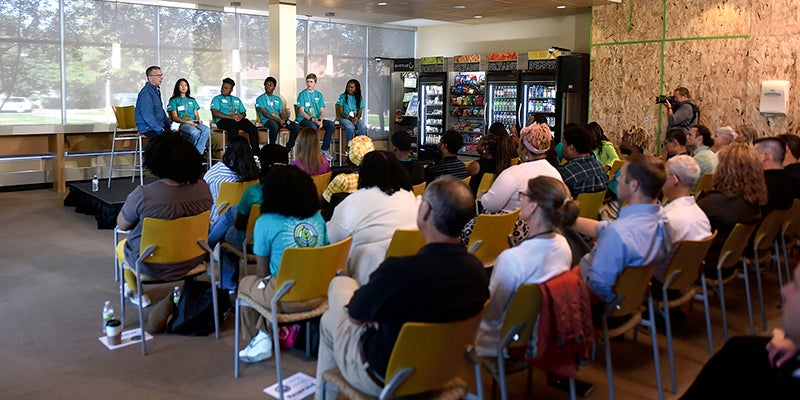Local officials share ideas on broadband with legislators
Published 4:10 pm Saturday, November 16, 2013

Corey Haugen, center, Information and Technologies Director for Austin Public Schools, tells a group of legislators, community organizers and telecommunications experts about the school district’s technology needs during a meeting at The Hormel Institute Friday. — Trey Mewes/trey.mewes@austindailyherald.com
Broadband Internet is becoming less a luxury service and more a basic utility.
That’s one of the messages local officials gave to state Sen. Matt Schmit, DFL-Red Wing, when Schmit visited Austin Friday as part of a week-long tour around the state discussing broadband.
“We really wanted to have a conversation … about why broadband is important in our lives,” Schmit told community organizers, telecommunications experts, school officials and other legislators at The Hormel Institute.
State officials are increasingly discussing broadband and connectivity issues as more economic, educational, health and entertainment opportunities become available.
Several experts said more Minnesotans are attending Internet-related conferences to learn about the best ways to spread Internet access. Legislators recognized the need for Internet access by creating the Office of Broadband Development earlier this year.
“For the last 10 years, we’ve spent a lot of time on broadband issues,” Schmit said.
Austin is no stranger to Internet connectivity issues. Local volunteers organized an effort to get Google to build a fiber optics network in Austin a little more than three years ago, and Vision 2020, the community improvement initiative, is concentrating on high-speed broadband access throughout the community as one of its 10 projects.
Yet Vision 2020 officials recognize building a community-wide network will take a lot of money.
“It seems that a lot of the successful projects we’ve studied are due to an injection of capital funding,” Mark Nibaur, Austin Utilities general manager and co-chair of Vision 2020’s Community-Wide Technology Committee, said.
The committee is awaiting the results of a broadband feasibility study, which Nibaur said should come before the committee in early 2014. After that, committee members will determine how best to approach broadband access throughout Austin.
Vision 2020 organizers say they need ways to get funding for the project, and legislators could make it easier for rural communities to undertake those issues by allowing communities to bond for funding or creating a state fee of 5 cents on Internet bills, similar to the federal fee included in phone bills for rural phone access. A 5-cent fee could generate $7 million to $15 million a year, according to Laura Helle, Vision 2020’s director of creative vision.
“Once it becomes a utility and it’s just expected, I think there’s a community responsibility to stay ahead of that curve and provide that, as a community,” Helle said.
While the fee is one of several ideas the Vision 2020 committee has come up with — Helle said volunteers will likely look to grants and private sources of revenue to help fund a broadband project — local legislators say they could examine outdated telecommunications policies to allow more flexibility for broadband projects.
“Maybe there’s some things we can do legislatively to take care of some of the policy issues regarding telephone use,” Sen. Dan Sparks, DFL-Austin, said. Sparks and Schmit said there were several laws dealing with telephone use that could be updated to reflect wireless communications, and Sparks believed legislators could start looking at tweaking those policies next year.
Rep. Jeanne Poppe, DFL-Austin, said she became interested in looking at educational finance after Austin Public Schools officials asked legislators to give schools more flexibility to spend on technology upgrades. Several area school districts have bought tablet computers and laptops for student use in recent years, and Austin started supplying fifth- and sixth-graders with laptops this year, with plans to outfit Ellis Middle School seventh- and eighth-graders next year.
“I know Austin is doing great and wonderful things,” Poppe said. “You think about some of these other schools that we’re going to compete and send students off, and it becomes much more of a have, and have-not [issue].”
Yet legislators acknowledged shifts in broadband policy may take some time, as private companies could push back against government regulation should legislators decide to drastically shift broadband policy to make it more of a utility and less of a service.
“I will be interested to hear what the private companies who provide these services say about that,” Poppe said.





